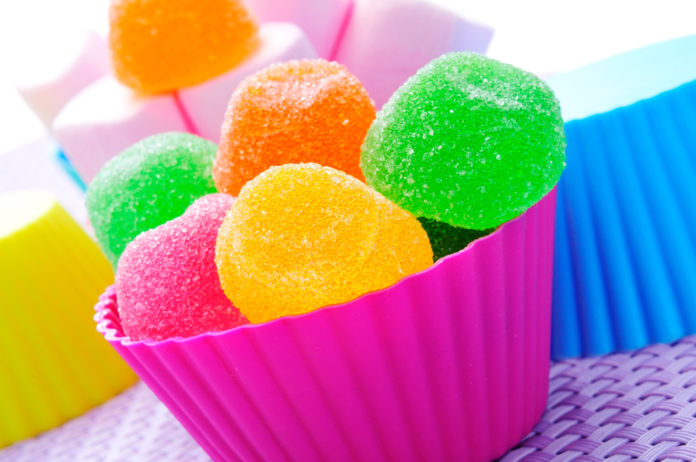The sweeping reclassification of allowable cannabis-infused edibles takes effect January 1; Existing inventory can be sold until stock is depleted or by April 3, 2019.
OLYMPIA, Washington – The Washington State Liquor & Cannabis Board (LCB) has issued a sweeping reevaluation of cannabis-infused candy that includes a ban on several categories of products, starting January 1, 2019. In an announcement issued October 3, the board said the move was prompted by concerns raised by “the Board, stakeholders, and the public regarding infused edible candy.”
Staff specifically “reevaluated all approved marijuana infused candy products to ensure the products align with current and new rules prohibiting products that are especially appealing to children,” said LCB. Results indicated that the board had mistakenly approved products that “would meet the definition of appealing to children.”
Those products were defined as:
- Candy – hard candy (of any style, shape or size) and tarts.
- Fruit chews, jellies and all gummy type products.
Accordingly, the board issued new guidelines to go into effect January 1, 2019, as follows:
“A marijuana processor is limited in the types of food or drinks they may infuse with marijuana. Marijuana-infused products that are especially appealing to children are prohibited. Products such as, but not limited to, gummy candies, lollipops, cotton candy, or brightly colored products, are prohibited.”
Criteria used to determine if a product is “appealing to children” include appearance, color, and similarity to other commercially available products marketed to children.
Edibles producers in the state have been described as “reeling” from the news. Diana Isaiou, owner of American Baked Co., told the Seattle Times that chews account for 60 percent of her sales. For another business, Craft Elixirs, infused candied fruit chews now make up 84 percent of sales.
Producing these products also means investing in expensive equipment, ingredients, and packaging. “These are people’s personal bank rolls,” Isaiou told the Times. “We don’t get business loans in the marijuana industry.”
LACB will hold a webinar October 16 to answer questions and address concerns. Information about how to register can be found HERE.
Below are more details about what is allowable under the LCB reevaluation.
Allowable infused products:
- Beverages
- Baked Goods
- Capsules
- Chips and Crackers
- Sauces and Spices
- Tinctures
Allowable infused products with limitations on appearance:
- Chocolate
- Cookies
- Caramels
- Mints
Examples of limitations:
- Chocolate in its original color and not coated, dipped, sprayed or painted with any type of color.
- Chocolate in the shape of a bar or ball. No shape or design that is especially appealing to children.
- Caramel and fruit caramels. No color, shape or design that is especially appealing to children.
- Cookies that do not contain sprinkles or frosting.
- Mints that have no color (white or white with small color fleck to represent the flavor only).
The announcement fails to explain how one is supposed to determine precisely which colors, shapes, and designs are “especially appealing” to children. Hopefully, it will be explained during the October 16 webinar.
Update
The Washington State Liquor and Cannabis Board temporarily walked back its plan to ban certain categories of edibles after receiving complaints from members of the industry. The board has called a 30-day halt to hear public comment. A webinar scheduled for this week has been postponed until November. The complete announcement is below:
OLYMPIA – The Washington State Liquor and Cannabis Board (WSLCB) today announced in a message to marijuana licensees that it will pause its marijuana edible product and label review for 30 days. During this time, the agency requested a coalition of industry organizations to bring forward alternatives for the agency to consider. Coalition members have indicated that they will be meeting later this month to discuss their proposal(s).
Some industry members expressed concerns following a marijuana-infused candy presentation at the Oct. 3, 2018 regularly scheduled Board meeting. A message was sent soon after clarifying the agency’s process for product and label review. Since the announcement, agency staff have had additional conversations with industry members and industry trade organizations that requested the WSLCB halt its product review and allow time for stakeholders to be heard. Specifically, a coalition of CORE, the Cannabis Alliance and Washington Cannabusiness Association together formally wrote the LCB requesting the same.
“In conversations with industry members, we agreed to pause the product and label review process to consider any alternative proposals from the industry,” said agency director Rick Garza
Regardless of whether it accepts an alternative proposal for certain edible products, the LCB will continue its practice of not allowing any product that it deems “especially appealing to children” to enter the marketplace. Preventing access to infused edibles that would be especially appealing to children and youth has always been a high priority of the Board. There has not been any recent rule changes that enacted that priority. The rule has been in place since 2015 in WAC 314-55-077(7), which states:
“A marijuana processor is limited in the types of food or drinks they may infuse with marijuana. Marijuana-infused products that require cooking or baking by the consumer are prohibited. Marijuana-infused products that are especially appealing to children are prohibited. Marijuana-infused edible products such as, but not limited to, gummy candies, lollipops, cotton candy, or brightly colored products, are prohibited.”
A webinar scheduled with licensees next week has been postponed until mid-November.












